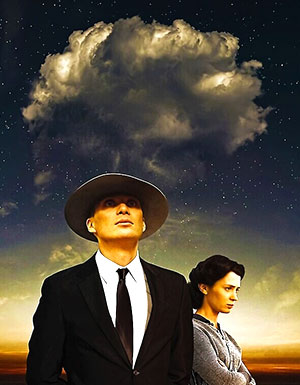We might say a person was born “ahead of their time” or that a person is an “old soul,” better suited to living in an earlier time.
To help keep this site running: Willow and Thatch may receive a commission when you click on any of the links on our site and make a purchase after doing so.
J. Robert Oppenheimer’s knowledge, abilities, character, and vision made him a man who was perfect for his time—and, most significantly, perfect for a task that would prove to be so momentous, it would change the course of the entire world.
And we are all paying the price for it.
Below, historical novelist Nancy Bilyeau reviews Oppenheimer (2023). Her seventh novel, The Orchid Hour, is available here August 10th, 2023.
“Oppenheimer” is AVAILABLE to STREAM
In the 2023 film “Oppenheimer,” director Christopher Nolan (Dunkirk, The Dark Knight) tackles some of the most profound questions imaginable about the responsibility of the scientist in war. He has delivered a tour de force of acting, writing, and cinematography. Emerging from a film culture dominated by CGI-driven comics and lumbering remakes, Nolan’s biopic seems an impossible feat.
How did this film get made? you can’t help wondering while sitting in the theater. Honestly, to bring a historical story with this much depth and driven by such unsettling philosophical questions to the big screen in 2023 seems almost as difficult as creating an atom bomb.
The movie spans over thirty years in a complex multiple time line, its earliest point showing Oppenheimer as a brilliant student in Europe in the 1920s not quite in control of his emotions. The narrative’s main dramatic arc follows Oppenheimer’s emergence as a leading physicist and talented teacher in America and his appointment as director of the secret laboratory in Los Alamos, New Mexico, but it doesn’t end there. The Trinity atomic test on July 16, 1945, the world’s first nuclear explosion, makes for an unforgettable sequence powered with tension.
Yet both before and after this harrowing section we see scenes of Oppenheimer’s 1954 security hearing and of Lewis Strauss’ 1959 Congressional quest to become a cabinet secretary, in which his complex relationship with Oppenheimer was front and center.
Cillian Murphy, the Irish actor best known up to now as the soulful gangster star of “Peaky Blinders,” embodies Oppenheimer and not just in his exterior—the gaunt yet dashing scientist clutching a pipe—but in his personality of brilliant arrogance spliced with moments of wry self-awareness and agonizing regret.
Nolan uses filmic technique to let us, the audience, understand things about Oppenheimer that wouldn’t hit you in the same way if read in a book. Throughout the movie, other characters complain about Oppenheimer’s ambivalence and reluctance to reveal his true feelings and loyalties. But from the very beginning, we see brief scenes of enormous dazzling clouds, pitiless fire, and other unearthly elements shimmering across the screen. These are the visions in Oppenheimer’s head, possibilities that inspire and frighten him as he turns them into the reality of planet Earth.
Oppenheimer, while given a job of crushing responsibility, has flaws. He is, as General Leslie Groves points out, a “womanizer.” Neither of the women in his life, his girlfriend Jean Tatlock (Florence Pugh) or his wife, Kitty (Emily Blunt), have it easy with Oppenheimer. Some critics have problems with the intimacy scenes with Jean, and while they are fairly graphic, they convey the passion that seared their souls. Oppenheimer didn’t marry Jean, and it’s suggested that while Jean depended on him emotionally, she had her own demons to contend with while she questioned his character. Kitty certainly doesn’t hold back from marrying, though she is just as troubled as Jean, and struggles with alcohol as she tries to raise children under difficult circumstances.
Both women are sympathetic to Communism and leftist causes in the 1930s, and the movie helps modern audiences understand how the plight of the Spanish Civil War and inequities in society made that so prevalent. Twenty years later, however, those sympathies would cause a lot of problems for Oppenheimer.
The scenes of Oppenheimer interacting with other scientists are master classes in acting. The standouts begin with Kenneth Branagh as Oppenheimer’s mentor, Niels Bohr, who tells him, “You are the man who gave them the power to destroy themselves and the world is not prepared.” The performance of Bennie Safdie as Hungarian physicist Edward Teller is mesmerizing, as you fear that his ambition to create a superior bomb will eliminate human morality.
At first it seems that Rami Malek is underused as physicist David Hill—until an emotional sequence that underlines one of the film’s themes, that the fellowship of scientists is stronger than any other human connection. Among all these great performances, a special category should be set aside for Tom Conti as Albert Einstein, who could simply see further than anyone else alive.
But its three characters who were not scientists that deliver some of the most unforgettable moments: Damon’s General Groves, Robert Downey Jr’s Strauss, and Gary Oldman’s President Harry Truman.
In his scenes with Oppenheimer, Groves brings some welcome humor and a seeming simplicity. But if you watch closely, Groves has various agendas at Los Alamos. And as the general briskly sets off for Washington, D.C., the morning after the Trinity test, leaving Oppenheimer with unanswered questions, a chill settles into the story. The striving Strauss is someone else who, for all his genius, Oppenheimer underestimates at critical junctures, to his cost. (When watching his scenes, it seems unbelievable that this is Robert Downey Jr. and you want to start a petition to divide him from the Marvel Universe.) And President Truman’s response to Oppenheimer’s confession that he feels he has blood on his hands drives home the fact that Oppenheimer has been outplayed.
So why did J. Robert Oppenheimer bend his scientific vision and leadership abilities to becoming “Death, the Destroyer of worlds”? If you’re looking for a film with a sledgehammer approach to morality, this isn’t it. When the Allies learn that German scientists are leaping forward with their bomb creation experiments, nothing seems as important as winning that race. Oppenheimer says that as a Jew, he must do everything in his power to help the other side. “We’re in a race against the Nazis and I know what it means if the Nazis have a bomb,” he says.
After the U.S. enters the war when Japan bombs Pearl Harbor, the way to stop evil becomes obvious to him. Once Hitler has committed suicide, the scientists are torn between pride in their amazing achievement and concern that this bomb isn’t as critically needed any longer. But it is simply too late to stop.
Art can help us wrestle with troubling moments in human history, bringing perspective and insight. In the historical drama “Oppenheimer” we all have an opportunity to do just that, while appreciating some of the finest acting and writing to reach the big screen in quite some time.
“Oppenheimer” is AVAILABLE to STREAM
Nancy Bilyeau is a magazine editor and historical novelist. Her seventh novel, The Orchid Hour, releases August 10th, 2023. To learn more, go to nancybilyeau.com and order your copy here.
If you enjoyed this post, wander over to The Period Films List. Also see the news about season 2 of “World on Fire.”

